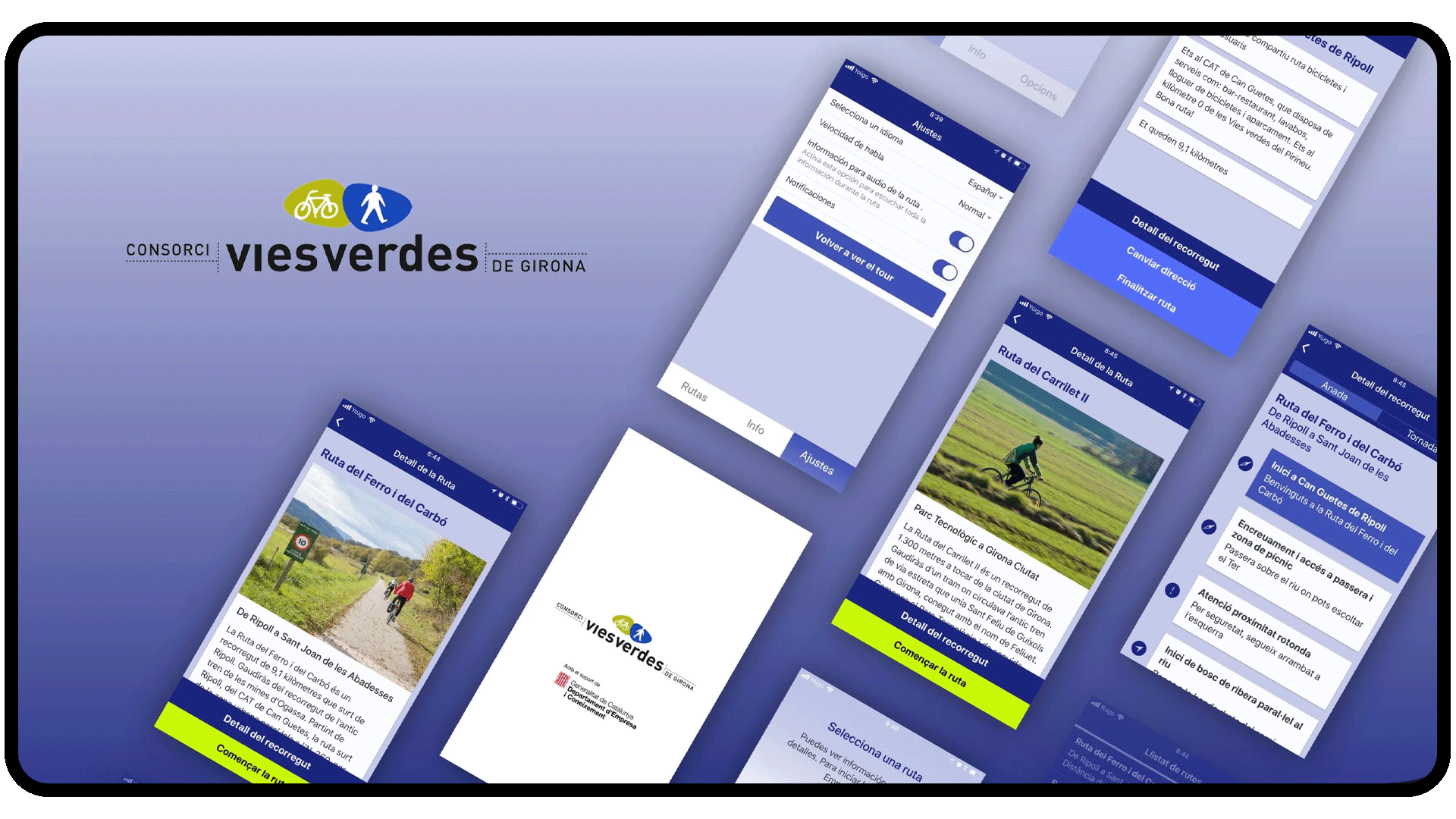Vies Verdes
Vies Verdes is a mobile platform to help visually impaired people to follow touristic tracks and their points of interest, which we built using Ionic and Ruby on Rails for the Diputació de Girona (Provincial Council of Girona).

The region of Girona, in northern Catalonia, has very diverse and beautiful landscapes, and it's one of the best regions to practise hiking and climbing. Nature in Girona offers a wide range of stunningly beautiful options.
The Provincial Council of Girona wanted to improve the experience of the visually impaired tourists hiking around the area through guided tracks.
To do this, they wanted to develop a mobile app that would behave like an audioguide. The app should help the visually impaired visitors to follow the tracks correctly, learning about the points of interest and following the audio instructions, guiding them along the tracks.
Each one of these tracks has got multiple points of interest (POI), which will be read out loud by the text-to-speech engine of the operating system of the phone. And in between these POI, the user will be given instructions to reach the next stop, indicating inclination of the surface, turns in the road, or even the presence of stairs or other eventualities.
We started off with a very minimalist design, using a palette of colours suitable for colorblind people. Then, we created an all-rounded UX with a very limited set of functionalities, to minimise the amount of on-screen information to allow for a lighter load of instructions and possibilities to be read out loud by the text-to-speech processor.
The process of conceiving the screens and their functionalities was also limited by the fact that we had a short time to deliver the project, but in all truth, this helped to trim down the functionalities list and to declutter the interface.
Having a visually impaired developer in the team was key to the success of the project. Not only he knew better than anyone how things needed to be structured, but also understood the technical implications of most decisions.
We also decided to use the operating system's text-to-speech engine to speed up the development process and because third-party libraries would be too expensive for this phase of the project, and none of them showed a significant improvement from the standard engines offered by operating systems.
MarsBased helped us to successfully accomplish this project for visually impaired people thanks to their committed team. The project went smooth & agile and I felt safe hiring them to develop the entire app.

Project tech stack
Ionic
Ionic is a complete open-source SDK for hybrid mobile app development created by Max Lynch, Ben Sperry, and Adam Bradley of Drifty Co. in 2013.Ruby on Rails
Ruby on Rails is a server-side web application framework written in Ruby under the MIT License.Docker
Docker is a set of platform as a service products that use OS-level virtualization to deliver software in packages called containers.PostgreSQL
PostgreSQL, also known as Postgres, is a free and open-source relational database management system emphasizing extensibility and SQL compliance.From the development perspective, we decided that Ionic was the right fit for this project. The time and budget limitations, plus a restricted and easy-to-implement set of functionalities went in accordance with what Ionic has to offer. We went fully hybrid for this project.
We must admit that we found some difficulties down the road, mostly due to having to integrate the background geolocation capabilities with the text-to-speech engine of the operating system and make it work across platforms. After evaluating many free plugins, we opted for a Cordova paid solution which simply worked.
As for the backend, we built it using Ruby on Rails to develop the administration panel for the application. Since the application needed to be installed "on premises" (something that usually happens with public administration), we used Docker to ease the deployment process.
We have also learnt a lot from this experience. If we had to pick up the highlights of the project, we'd say these three:
Working with ARIA (Accessible Rich Internet Applications) markup, which ensures the highest degree of accessibility of the contents within the app.
Working with a visually impaired developer to compensate for our lack of experience in this field.
Implementing background geolocation features, for background services are always a little trickier in hybrid mobile apps.
In hindsight, we're very happy to have developed this project. We do not often have the opportunity to work on accessibility projects, which speaks at length how much most companies care about this part of the population.
You can visit the Vies Verdes website to learn more about these paths and trails, or download the app here: